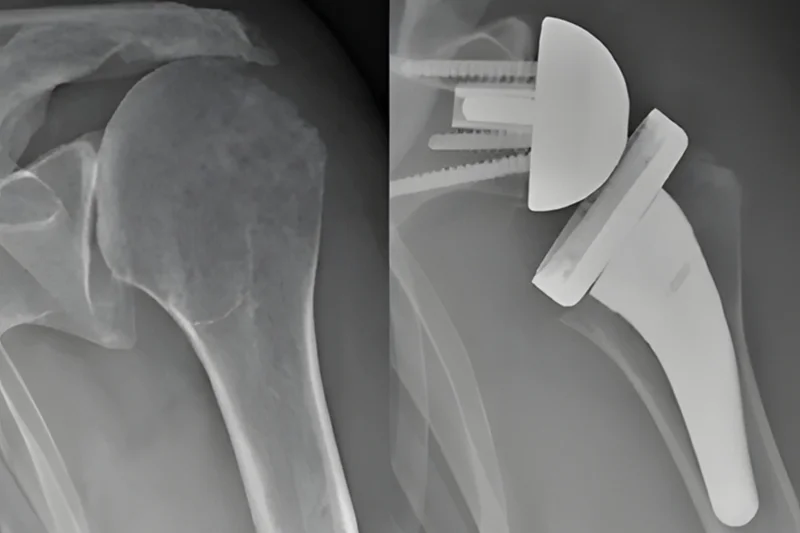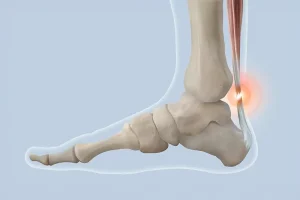Shoulder prosthesis
Restore your mobility and eliminate pain with a shoulder prosthesis
Home » Orthopedic Surgery » Shoulder Prosthesis
Conditions Treated

If you feel discomfort in your shoulder, have lost mobility, and traditional treatments no longer provide the expected results, shoulder replacement may be the right solution for you. This surgical procedure replaces the shoulder joint with a specially designed prosthesis, helping to restore functionality and reduce pain.
At VenArt Clinic, we use modern, minimally invasive techniques that ensure rapid recovery and proven, long-term results. Our goal is to help you regain your mobility and enjoy an active life again, without pain or restrictions.
Book an Appointment
What is shoulder replacement?
Shoulder replacement or arthroplasty is a surgical procedure recommended for patients suffering from severe shoulder conditions, such as advanced osteoarthritis or irreversible joint damage. The procedure involves replacing the damaged joint with a prosthesis specially designed to restore mobility and eliminate pain.
When is a shoulder replacement necessary?
This procedure is recommended when:
- You have persistent shoulder pain, even at rest;
- Mobility is limited and raising your arm becomes difficult;
- Conservative treatments (medication, physical therapy) are no longer effective.
Common causes that may lead to the need for a prosthesis include:
- Shoulder osteoarthritis: deterioration of the joint cartilage;
- Severe injuries or fractures: which cannot be treated by non-surgical methods;
- Rheumatoid arthritis: which causes inflammation and affects the joint;
- Rotator cuff injuries: which prevent the shoulder from functioning normally.

How is the diagnosis made?
To decide whether a shoulder replacement is the right solution, your doctor will perform:
- A detailed clinical consultation: assessment of movement and pain levels;
- Imaging tests: X-ray, MRI, or CT scan to analyze the condition of the joint and soft tissues.
Types of surgical procedures
There are two main methods for fitting a shoulder prosthesis:
- Traditional (open) surgery: involves a larger incision and a longer recovery time;
- Minimally invasive surgery: performed using small incisions and modern techniques, thereby reducing post-operative pain and speeding up recovery.
The doctor will recommend the most appropriate method based on each patient’s individual characteristics.
What are the benefits of shoulder replacement surgery?
A shoulder replacement can be an effective solution if you are experiencing persistent pain and reduced mobility in your shoulder. It replaces the damaged joint, providing improved functionality and increased comfort in everyday life. Among the main benefits you can enjoy are:
- Pain reduction: most patients notice a significant improvement within the first few weeks;
- Regained mobility: the prosthesis allows for smoother and more natural shoulder movements;
- Improved quality of life: patients can return to their daily activities without discomfort;
- Quick recovery: thanks to minimally invasive techniques, physical therapy can begin shortly after surgery.
What are the risks of the procedure?
As with any surgical procedure, it is important to know that shoulder replacement involves certain risks:
- Infections: rare, but possible at the incision site;
- Damage to nerves or blood vessels: which can lead to numbness or weakness;
- Prosthesis dislocation: in exceptional cases, the prosthesis may become unstable;
- Deep vein thrombosis: formation of blood clots, requiring additional treatment.
The doctor will discuss the risks and benefits of the procedure with you so that you can make an informed decision.
How is recovery after surgery going?
The recovery period varies depending on the surgical approach chosen and your overall health. It includes:
- Physical therapy: This is essential for regaining mobility and strength in the shoulder. You will follow a personalized exercise program to restore shoulder function.
- Rest: In the first few days after surgery, rest is necessary to reduce inflammation;
- Progress monitoring: Your doctor will closely monitor your recovery and adjust your treatments as needed.
When should you contact your doctor?
It is important to contact your doctor if you notice signs of infection, such as redness, swelling, or fever, or if the pain becomes severe and does not respond to treatment.
Why choose VenArt Clinic?
- You have access to a team of specialists with extensive experience in orthopedics;
- You benefit from a quick recovery thanks to the modern techniques we use;
- You receive personalized care from a dedicated team, ready to offer you the best solutions for your health.
If you need more information or would like to schedule a consultation, please do not hesitate to contact us.
Medical Team
Frequently Asked Questions
What is a shoulder prosthesis?
A shoulder prosthesis is a medical device used to replace a damaged shoulder joint, either partially or completely, with artificial metal and plastic components.
When is a shoulder replacement necessary?
Shoulder replacement is recommended in cases of severe osteoarthritis, rheumatoid arthritis, complex shoulder fractures, or irreversible damage to the rotator cuff.
What are the types of shoulder prostheses?
- Anatomical prosthesis: replaces both the humeral head and the glenoid cavity, and is recommended for patients with intact joints;
- Reverse prosthesis: suitable for patients with severe rotator cuff injuries, changing the position of the components to improve stability;
- Hemiarthroplasty: replaces only the humeral head and is used in certain fractures or partial damage to the joint.
How long does recovery take after surgery?
The recovery period varies between 3 and 6 months, depending on the type of prosthesis and compliance with the rehabilitation program. Physical therapy is essential for restoring mobility and strength.
How long does a shoulder prosthesis last?
The average lifespan of a shoulder prosthesis is approximately 10-20 years, depending on the patient’s activities and wear and tear on the components.
Can I return to my usual physical activities after prosthetic surgery?
Yes, but contact sports and activities that put excessive pressure on the shoulder should be avoided. Swimming, walking, and maintenance exercises are recommended.
What do I need to do to take care of my dentures?
Follow the prescribed recovery program, avoid sudden movements or excessive weight, and go for regular checkups to monitor the condition of the prosthesis.
How long should the brace be worn after surgery?
The brace should usually be worn for 4-6 weeks to protect the joint and allow it to heal properly.








